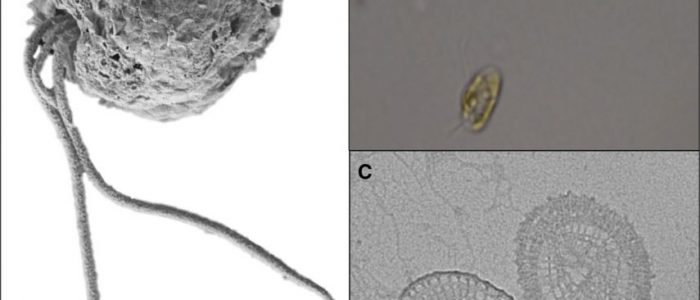Golden algae (Prymnesium parvum) is a single-celled organism that lives in water. It occurs worldwide, primarily in coastal waters, but it’s also found in rivers and lakes. It doesn’t always cause problems, but when it “blooms” – which means it enters a phase of rapid growth and reproduction, this algae can produce toxins that cause fish kills. The toxins affect organisms that have gills: all types of fish, freshwater mussels and clams, and the gill-breathing juvenile stage of frogs and other amphibians.
There is no evidence that golden algae toxins pose a direct threat to humans, other mammals, or birds; however, people should avoid picking up dead or dying fish for consumption.
Golden Algae was first discovered in Arizona in 2005 in a man-made lake in Gilbert.
How it got here is still unknown, but like all aquatic invasive species, this organism can easily spread. As a chlorophyll-containing organism, it can produce its own food, like any other plant by using sunlight and nutrients. Golden algae can also release chemical compounds that combine with minerals in the water to produce toxins that cause fish kills. This is in order to release nutrients and feed.
Golden alga bloom dynamics and toxin formation are still not well understood. Some treatments have proved effective for ponds and small reservoirs, but to date there is no feasible way to control golden alga in large reservoirs and rivers.
Lake Maintenance Service has developed a very effective method of testing and treating golden algae. If it is discovered early and treatment can begin right away it can be brought under control rather quickly. It does spread very easily, so a lake that has been previously treated and the golden algae killed can be re-infected.
A golden algae fish kill may last for days, weeks, or months. Sometimes, only a portion of a lake is affected, but the location can change from one day to the next. In our experience, we have seen that blooms are more likely to occur in cooler weather, and sometimes taper off as the water warms and other species of algae become more active – but that isn’t always the case.
Treatment usually involves application of an algaecide such as copper sulfate. Unfortunately, there is no magic cure to remove golden algae from the waters it occupies. We can only prevent the spread to the best of our abilities. Fishermen and women can help by making sure equipment such as boats, live wells, boots, and waders have thoroughly dried between use in different waters.
Golden algae is a tiny organism that has the potential to wreak havoc wherever it grows and, unfortunately, it is spreading; but rest assured it doesn’t automatically mean doom and gloom for the infected water. And don’t worry, the golden algae isn’t harmful to pets or other terrestrial wildlife if they contact or drink the lake water.
If you suspect Golden Algae is present in your water feature, pond, or lake and you would like to confirm its presence, please give us a call at Lake Maintenance Service.


Comments are closed.